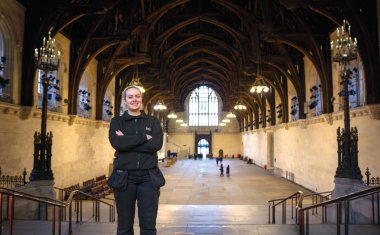BSIA launches new guide to securing Heritage properties
BSIA launches new guide to securing Heritage propertiesThe British Security Industry Association (BSIA) has recently published a new Guide to Security of Heritage Properties (Form ...
BSIA launches new guide to securing Heritage properties
The British Security Industry Association (BSIA) has recently published a new Guide to Security of Heritage Properties (Form 188) designed to provide owners, managers and guardians of all kinds of heritage and property with an overview of the common considerations of risk assessments and security measures to be taken account on heritage sites.
What is the aim of the Heritage Security Guide?
The guide aims to describe the security threats faced by historic properties (as well as those with a shared community value) and explain the techniques, products and services available to protect them. Paul Phillips, Technical Officer at the BSIA and author of the guide comments: "Caring for a heritage property is by no means a cheap exercise and putting right damage after a crime could cripple owners financially so providing good security is essential. Protecting unique properties often means using unique and costly solutions but with the help of this guide owners should be able to make the most of limited resources and help save our history and culture for the future."
Who would benefit from reading the Heritage Security Guide?
The guide is primarily intended for owners of private houses, smaller businesses in listed properties, custodians of individual properties open to the public and groups of volunteers caring for heritage in their community.
What's unique about Heritage security?
Heritage security is unique in that alterations can devalue sites considerably. Often the listed nature of heritage properties means that modern security measures that are usually commonplace are not permitted. Even where security measures are permitted, they often prove more costly for listed buildings. The new Heritage Security Guide offers helpful, independent advice on this free of charge to BSIA members and non-members alike.
Heritage security is an important aspect of heritage property maintenance. For example, it is often the case that heritage properties have been built without consideration for modern criminal behaviour. Any modernising security measures must therefore be weighed carefully against the 'devaluing effect' significant alterations can incur. That is, security measures need to be as unobtrusive as possible - a Georgian shop front with external roller shutters becomes a bland modern building. Similarly, fitting CCTV cameras to the front of a historic house can be unappealing and - in some instances - may breach regulationse.
Heritage properties are often located in open areas, remote from neighbours. This level of isolation makes them more difficult to protect. Similarly, (as is often the case) the need to allow authorised public access can inadvertently facilitate criminal access. Simon Alderson, Development Director of BSIA member company Vacant Property Specialists (VPS) and Chairman of the BSIA's Vacant Property Protection group, comments on the potential security risks involved in heritage sites:
"Heritage sites are often remote and packed with materials that can attract crime - lead roofs, copper piping, old libraries. It sounds like something from a Cluedo set, but for the few pounds thieves may obtain from selling stolen metals, they can cause tens of thousands of pounds of damage. Plus vacant sites are also targets for illegal raves and squats."
The Heritage Security Guide explains ways in which security measures can be employed and installed in what can appear to be complicated circumstances. It also details ways to achieve effective security within the boundaries of available resources.
What's in the Heritage Security Guide?
Alongside informed suggestions, the guide contains case-studies detailing how BSIA member companies have provided security and protection for heritage properties. It also describes a unique way of approaching security that should help end-users facing difficult decisions relating to the allocation of resources.
Why is it worth reading compared to other publications?
This guide provides a huge benefit to those seeking expert, independent advice. Given the often unique nature of heritage sites and the security issues surrounding them, it is especially important to draw on the expertise of those with experience in this particular field.
Where else can individuals go for advice beyond the Heritage Security Guide?
For larger or more complex problems the employment of a security consultant can often provide cost-effective advice for a combination of practices and equipment. It is always advisable to talk to your insurers as insurance companies can provide valuable advice. Further, if you fail to follow their recommendations this could be a problem in the event of a claim.
To download the BSIA's Heritage Guide, (Form 188) free of charge please visit the BSIA Website.















